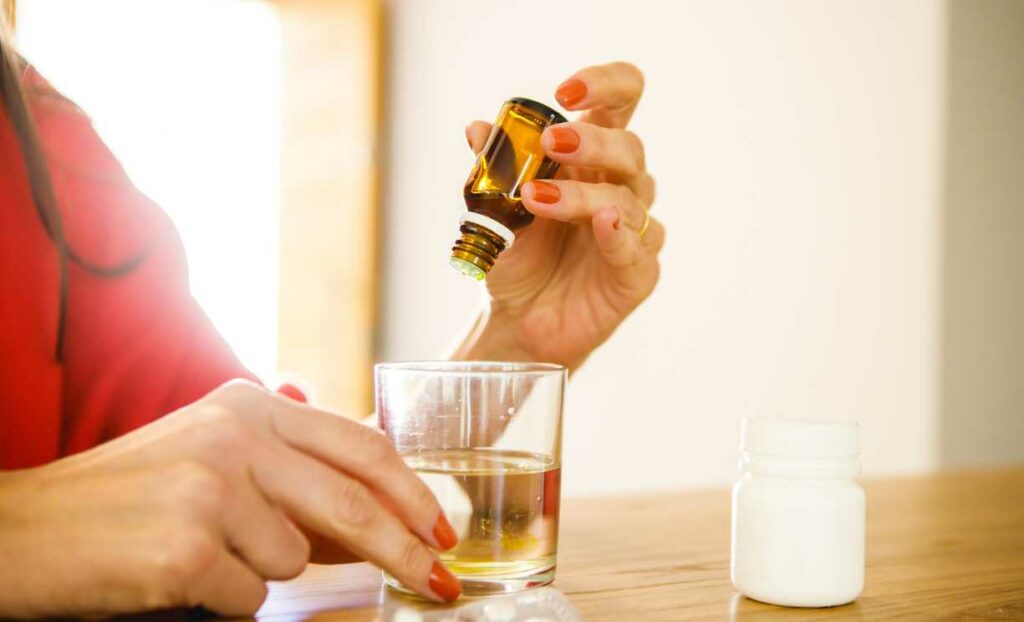Hot flashes, a common symptom during menopause, can disrupt daily life and impact overall well-being. While conventional treatments exist, many individuals seek natural alternatives to manage hot flashes. In this blog, we’ll explore the realm of natural medicines for hot flashes, tapping into the healing properties of herbs, lifestyle adjustments, and holistic practices that offer relief without the use of pharmaceuticals.
Contents
Understanding Menopause And Its Symptoms
Menopause is the permanent cessation of menstruation and fertility. It is a normal part of aging and occurs when ovaries don’t release eggs and produce lower levels of hormones. The transition into menopause is called perimenopause, during which women may experience a range of symptoms.
Here are some common symptoms of menopause:
- Irregular Menstrual Cycles: As women approach menopause, menstrual cycles may become irregular. Periods may be shorter, longer, heavier, or lighter than usual.
- Hot Flashes and Night Sweats: Hot flashes are sudden feelings of warmth, often accompanied by sweating and a flushed face. Night sweats, which are hot flashes during sleep, can also disrupt sleep patterns.
- Vaginal Dryness and Discomfort: Decreased estrogen levels can lead to vaginal dryness and thinning of the vaginal walls, causing discomfort, itching, and pain during intercourse.
- Sleep Disturbances: Changes in hormone levels can contribute to sleep disturbances. Insomnia or difficulty staying asleep may occur during menopause.
- Mood Changes: Hormonal fluctuations can impact mood. Some women may experience irritability, mood swings, anxiety, or depression during menopause.
- Changes in Libido: A decline in estrogen levels can affect sexual desire. Some women may experience changes in libido during and after menopause.
- Weight Gain and Changes in Body Composition: Hormonal changes, coupled with aging, can contribute to changes in body composition, including an increase in abdominal fat.
- Changes in Skin and Hair: Reduced estrogen levels may lead to changes in skin elasticity, dryness, and thinning hair.
- Bone Density Loss: Estrogen plays a role in maintaining bone density. The decline in estrogen during menopause can contribute to bone loss and increase the risk of osteoporosis.
- Memory and Concentration Changes: Some women may experience cognitive changes, including difficulties with memory and concentration, during menopause.
Treatment Options For Hot Flashes
Managing hot flashes often involves a combination of behavioral strategies, and, in some cases, medical interventions. Here are various treatment options for hot flashes:
- Hormone Replacement Therapy (HRT): Hormone replacement therapy (HRT) involves administering estrogen alone or with progesterone (for women with a uterus) to replace declining hormone levels in menopausal women, alleviating symptoms like hot flashes. Despite its effectiveness, HRT comes with potential risks, and you should consult with a healthcare provider before taking it, considering an individual’s overall health.
- SSRIs and SNRIs: Antidepressants like paroxetine (SSRIs) and venlafaxine (SNRIs) are prescribed to manage hot flashes by affecting neurotransmitters in the brain. While generally well-tolerated, potential side effects and interactions should be discussed with a healthcare provider to determine appropriateness.
- Gabapentin and Pregabalin: Originally designed for seizures, these medications are sometimes used off-label for hot flash management, modulating nerve activity to reduce intensity and frequency. Individual response varies, necessitating consultation with a healthcare provider to assess suitability.
- Brisdelle (Paroxetine Mesylate): Brisdelle, an FDA-approved non-hormonal medication, works similarly to paroxetine (SSRI) in providing relief from hot flashes. Potential side effects and suitability for an individual should be discussed with a healthcare provider prior to use.
- Clonidine: Your doctor may prescribe this for high blood pressure, and can help with hot flash management by affecting the central nervous system. Individuals considering clonidine should discuss potential side effects and interactions with their healthcare provider.
- Estrogen Receptor Modulators: Medications like tamoxifen, primarily used in breast cancer treatment, are being studied for hot flash reduction. These modulate estrogen receptors, influencing hormonal balance. The use of these medications is still under investigation, requiring consultation with a professional to understand the risks.
Natural Medicines For Hot Flashes
Experiencing hot flashes can be a challenging aspect of menopause, but many women explore natural remedies to manage these symptoms. Here are some natural medicines and lifestyle changes that may offer relief from hot flashes:
- Black Cohosh: Derived from a plant native to North America, black cohosh has been traditionally used to alleviate menopausal symptoms, including hot flashes. It also has estrogen-like effects that may help balance hormonal fluctuations.
- Soy Isoflavones: Found in soybeans and soy products, soy isoflavones have estrogen-like properties that may help regulate hormonal imbalances associated with menopause. Some women find relief from hot flashes by incorporating soy-rich foods or supplements into their diet.
- Flaxseed: Rich in omega-3 fatty acids and lignans, flaxseed is known for its potential to alleviate hot flashes. It can be added to meals, and the nutrients in flaxseed may contribute to hormonal balance.
- Evening Primrose Oil: Extracted from the seeds of the evening primrose plant, this oil contains gamma-linolenic acid, which is believed to influence hormonal balance. Some women find relief from hot flashes by taking evening primrose oil supplements.
- Vitamin E: An antioxidant, vitamin E has been studied for its potential to reduce the severity of hot flashes. Foods rich in vitamin E include almonds, sunflower seeds, and spinach.
- Chasteberry (Vitex): It comes from the Vitex agnus-castus plant, chasteberry can help influence hormonal balance and may provide relief from menopausal symptoms, including hot flashes.
It’s important to note that responses to these remedies may vary, and their effectiveness is still a topic of research. Before incorporating any new supplements into your routine, it’s advisable to consult with a healthcare professional, especially if you have underlying health conditions or are taking medications.
Alternative Therapeutic Options For Hot Flashes
For those seeking alternatives to traditional medical interventions, several therapeutic options may help manage hot flashes. These alternative approaches often focus on lifestyle modifications, natural remedies, and mind-body techniques. Here are alternative therapeutic options for hot flashes:
- Mind-Body Techniques: Practices like mindfulness meditation, yoga, and tai chi focus on the mind-body connection and may help manage stress, potentially reducing the frequency and severity of hot flashes.
- Acupuncture: Acupuncture involves the insertion of thin needles into specific points of the body. Some women report a reduction in hot flashes after incorporating acupuncture into their wellness routine.
- Dietary Changes: Including certain foods in the diet, such as soy products, flaxseed, and foods rich in vitamin E, may offer natural relief from hot flashes. These foods contain compounds that may help balance hormonal fluctuations.
- Cooling Strategies: Use cooling techniques, such as cooling towels, fans, or cooling gels, to manage the body’s temperature during hot flashes.
- Biofeedback: Biofeedback involves learning to control physiological functions, such as heart rate and muscle tension, to reduce stress and potentially alleviate hot flashes.
- Aromatherapy: Some women find relief from hot flashes through the use of essential oils, such as peppermint or lavender, either applied topically or diffused.
- Hypnotherapy: Hypnotherapy, conducted by a trained professional, involves deep relaxation and focused attention, potentially helping manage stress and reduce the impact of hot flashes.
- Chiropractic Care: Chiropractic adjustments may help support overall well-being, and some women report a reduction in the frequency of hot flashes after chiropractic sessions.
Conclusion
In conclusion, natural medicines for managing hot flashes provide diverse options that empower individuals navigating the challenges of menopause. From herbal supplements like black cohosh to mind-body practices such as yoga and acupuncture, these natural approaches offer a holistic and often gentler alternative to traditional medical interventions. The significance of lifestyle adjustments and the incorporation of essential oils underscores the interconnectedness of symptom management.
By combining the wisdom of natural approaches with personalized healthcare guidance, individuals can navigate the journey through menopause with grace and confidence, embracing the power of nature to support them through this transformative chapter of life.
If you are facing menopause-related issues, menopause treatment at HerMantra can help. Book your free trial online menopause treatment session now.




